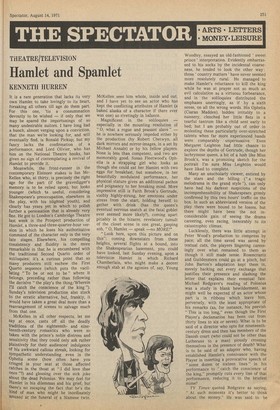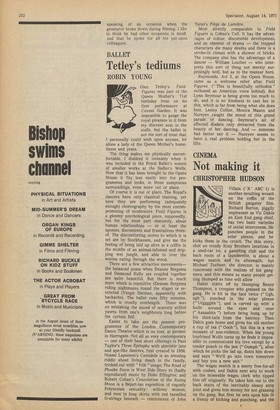THEATRE/TELEVISION
Hamlet and Spamlet
KENNETH HURREN
It is a rare generation that lacks its very own Hamlet to take lovingly to its heart, forsaking all others till age do them part. For this one, 'tis a consummation devoutly to be wished — if only that we may be spared the importunings of so many undesirable suitors. I have long had a hunch, almost verging upon a conviction, that the man we're looking for, and will eventually find, is Ronald Pickup; but my fancy lacks the confirmation of a performance, and Lord Olivier, who has him on the National Theatre books, has given no sign of contemplating a revival of Hamlet to provide it.
Meanwhile, the front-runner in the contemporary Elsinore stakes is Ian McKellen who, at thirty, is precisely the right age for the part (if the gravedigger's memory is to be relied upon), but looks younger (which 'is useful, considering Shakespeare's preoccupation, elsewhere in the play, with his blighted youth), and clearly has years yet in which to polish further a personation that is already very fine. He got to London's Cambridge Theatre last week in the Prospect production of Hamlet, a three-and-three-quarter-hour version in which he loses his authoritative command of the character only in the very late stages. Elsewhere, his compelling consistency and fluidity is the more remarkable in that he is encumbered with the traditional Second Quarto order of soliloquies: it's a curious point that so many producers still eschew the First Quarto sequence (which puts the vacillating "To be or not to be" where it belongs, preceding rather than following the decisive "the play's the thing/Wherein I'll catch the conscience of the king "). Sunday's television production also stuck to the erratic alternative, but, frankly, it would have taken a great deal more than a rearrangement of scenes to salvage much from that one.
McKellen in all other respects, let me say at once, casts off all the deadly traditions of the eighteenthand nineteenth-century romantics who were so taken with the prince's noble distress and sensitivity that they could only ask rather Plaintively for their audiences' indulgence of his awkward callous streak, looking for Sympathetic understanding even in the Ophelia scene (how often have you cringed in your seat at those affected catches in the thoat at "I did love thee once "?) and glossing over the sick joke about the dead Polonius. We may feel for Hamlet in his dilemmas and his grief, but there's no escaping the fact that he's the kind of man who might be inordinately amused at the funeral of a Siamese twin. McKellen sees him whole, inside and out, and I have yet to see an actor who has kept the conflicting attributes of Hamlet (a baked alaska of a character if there ever was one) so rivetingly in balance.
Magnificent in the soliloquies — especially in the mounting resolution of " 0, what a rogue and peasant slave" — he is nowhere seriously impeded either by the production (by Robert Chetwyn, all dark mirrors and mirror-images, in a set by Michael Annals) or by his fellow players. None is less than competent, and two are memorably good. Susan Fleetwood's Ophelia is a strapping girl who looks as though she could eat her Hamlet with two eggs for breakfast, but somehow, in her beautifully modulated performance, her physical stature gives an additional pathos and poignancy to her breaking mind. More impressive still is Faith Brook's Gertrude, visibly highly-strung, her emotions under stress from the start, holding herself to gether with drink (has the queen's eventual nervous snatch at the fatal goblet ever seemed more likely?), coming apart pitiably in the bizarre, revelatory tumult of the closet scene in one great, gasping sob, "0, Hamlet — speak —no MORE!"
"Look here, upon this picture and on this": coming downstairs from these heights, several flights at a bound, into the Shakespearian basement, you could have looked, last Sunday evening, upon a television Hamlet in which Richard Chamberlain, who might make a decent enough stab at the agonies of, say, Young Woodley, essayed an old-fashioned ' sweet prince' interpretation. Evidently embarrassed to his socks by the incidental coarseness, he tended to look the other way : those 'country matters' have never seemed more resolutely rural. He managed to make Hamlet's reluctance to kill the king while he was at prayer not so much an evil calculation as a virtuous forbearance, and in the soliloquies distributed the emphases unerringly, as if by a sixth sense, on all the wrong words. His Ophelia (Ciaran Madden), bidden irritably to a nunnery, clenched her little fists in a tearful tantrum like a child sent early to bed; but I am probably out of order in molesting these particularly over-stretched talents when far more experienced hands were comparably unpersuasive. Even Margaret Leighton had little chance to explore the depths of Gertrude, though her lachrymose queen, a bit of a lush like Miss Brook's, was a promising sketch for the portrait I'm sure Miss Leighton would have liked to complete.
Many an unscholarly viewer, enticed by the stars and the billing (" a tragic melodrama in the grand style "), can only have had his darkest suspicions of the incomprehensibility of Shakespeare grimly confirmed by this two hours' traffic on the box. In such an abbreviated version of the play there were bound to be losses, but there might have been the not inconsiderable gain of seeing the drama careering, even racing, inexorably to its catastrophic climax.
Lucklessly, there was little attempt in Peter Wood's production to compress by pace; all the time saved was saved by textual cuts, the players lingering caressingly over what remained to them as though it still made sense. Rosencrantz and Guildenstern could go at a pinch, but John Barton's adaptation kept them in, merely hacking out every exchange that justifies their presence and slashing the letter that explains their eventual fate.
Michael Redgrave's reading of Polonius was a study in blank bewilderment, as might well be expected of an actor whose part is in ribbons which leave him, perversely, with the least appropriate of his remarks (as, for instance, his peevish "This is too long," even though the First Player's declamation has been cut from thirty lines to six or seven). What is to be said of a director who opts for nineteenth century dress and then has members of the Danish court (who could not be other than Lutherans to a man) piously crossing themselves in the presence of death? What is to be said of an adapter who, having established Hamlet's connivance with the Player in inserting a provocative speech of "some dozen or sixteen lines " in his performance to " catch the conscience of the king," promptly cuts every line of that performance, reducing it to the briefest mime?
TV Times' quoted Redgrave as saying, " At such moments it's better to think about the money." He was said to be speaking of an occasion when the generator broke down during filming. I like to think he had other occasions in mind, and that he spoke for all his put-upon colleagues.



































 Previous page
Previous page